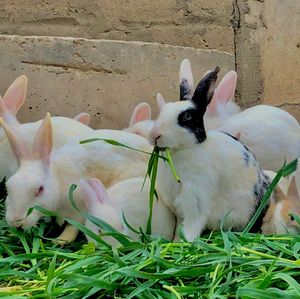
Dental disease is common in rabbits. Common dental issues encountered in rabbits include abnormal bites, overgrowth of teeth, abnormal bite, gingivitis and periodontitis, and tooth abscesses. Gastrointestinal movement is often impacted as a result in decreased food intake and pain from the abnormal teeth.
Rabbits with dental issues may have inappetence to anorexia, weight loss, difficulty eating, drooling with wet fur on the face and forelimbs, change in fecal appearance, gastrointestinal stasis, unkempt fur, watery eyes, difficulty breathing, eye swelling, issues moving the jaw, enlarged lymph nodes under the chin, and to the bone if the jaw on palpation.
Following a thorough oral examination of incisors, premolars, molars, gingiva, tongue, and cheeks your veterinarian will also palpate the jaw looking for discharge in the mouth that may indicate abscess formation. Skull radiographs (x-rays) are often recommended to evaluate the bite, and tooth lengths, and investigate for the presence of hidden problems. If an abscess is found, bacterial culture and sensitivity may also be warranted to determine the cause of the infection. A complete blood count and serum biochemistry are also often necessary prior to anesthesia as surgery is often indicated with dental disease in rabbits.
While minor premolar or molar spikes may be trimmed with molar cutters using manual restraint, it’s important to understand that when done incorrectly this may cause vertical dental fractures and sharp edges may damage the soft tissues of the mouth. Overgrown incisors should be trimmed by your veterinarian into proper occlusion using Dremel taking care not to trim into dental pulp. Nail clippers should never be used to trim teeth as this can cause pain and permanent damage.
For more extensive malocclusion, hooks, ramps, wave patterns, or periodontal disease require dental surgery including filing and/or extractions. Periapical abscesses require dental surgery, abscess treatments, prescription pain medications, and antibiotics.
Any problems with the diet that may be contributing to dental issues should be corrected. Hay should comprise 70-80% of the diet to aid in the natural grinding of cheek teeth.
Animals that are not eating should be assist fed with Oxbow Critical Care until able to eat well again on their own.
The patient’s prognosis depends on the extent of dental disease. Malocclusions are often chronic problems that need regular checks and trims or dental surgery to prevent severe disease and gastrointestinal complications.
We recommend a recheck examination 1 month after dental surgery, regular rechecks may be necessary every month to 6 months depending on the severity of dental changes. Rabbit owners should monitor closely for reduced appetite, drooling, decreased stool production, or loss of appetite before changes become monitor severe.
Copyright © All Rights Reserved
